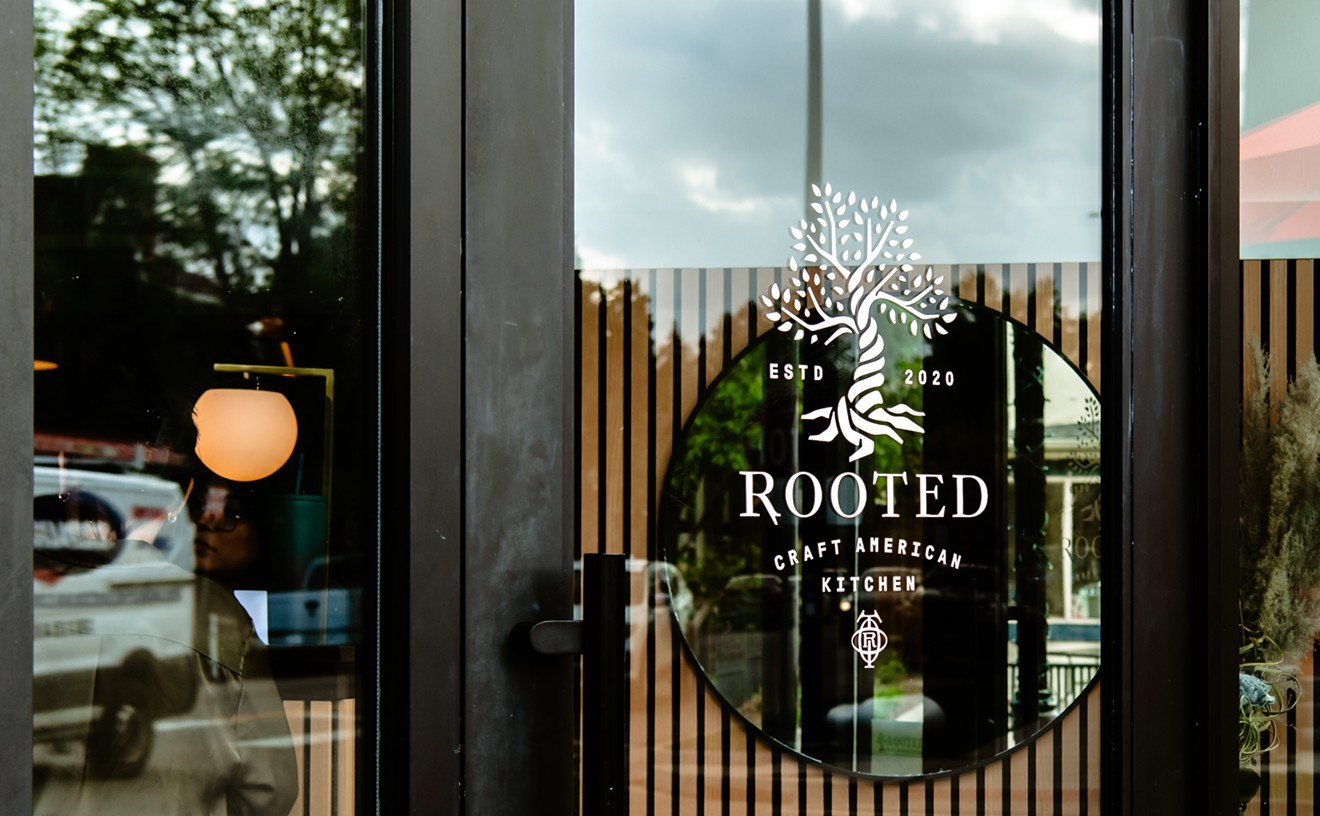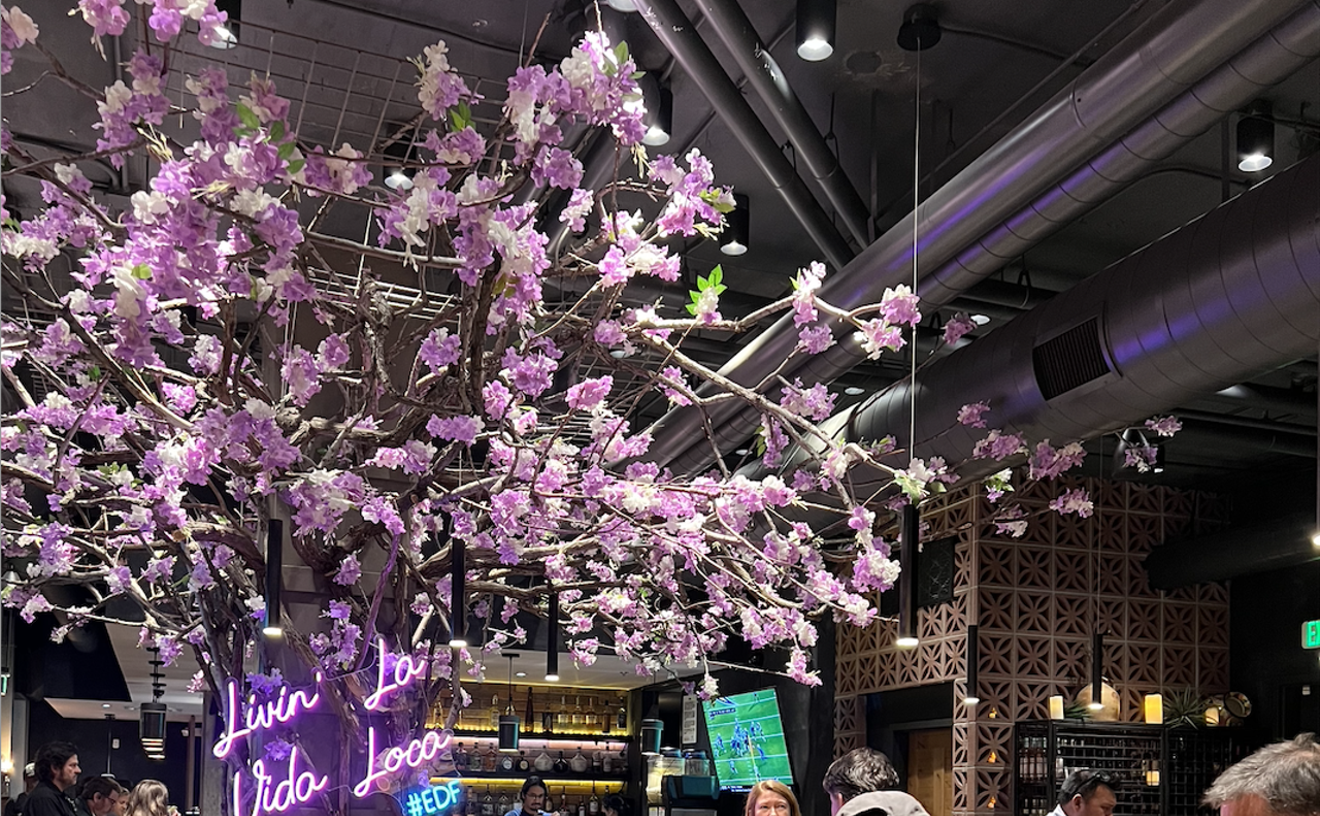But save your sympathy: Phill Corbin thinks he has the best restaurant gig in town; he leads the cliff-diving crew at Casa Bonita.
"I splash little kids for a living," Corbin says. "That's hard to beat."
"It's hard to consider this a job," agrees Stephanie Pansini, another Casa Bonita diver. "I get paid for playing in the water."
The cliff-diving concept was the brainchild of Casa Bonita founder Bill Waugh, who opened his eatertainment palace in a former department store in Lakewood's JCRS Shopping Center, back in 1974. Today, the restaurant lures as many as 20,000 visitors a week, many of them third-generation patrons who crave Casa Bonita's blend of kitschy entertainment (everything from divers to mock gunfights to roving mariachi bands) and (very) mainstreamed Mexican food. A second Casa Bonita operates in Tulsa, Oklahoma -- sans divers.
But in Denver, the divers are the main attraction. "It's the centerpiece of our entertainment," says Mike Mason, vice president of operations for Star Buffet, which owns the two establishments. And that entertainment has helped make Casa Bonita one of the largest-grossing restaurants in the state, despite cuisine that gives a different meaning to the concept of "gross sales," according to its kitchen's detractors. "We have people who eat here ten to fifteen times a year," Mason responds. "We have to make food that caters to a wide variety of people. We're very proud of that."
The low-priced, accessible fare, along with the amusements included in the price of a meal, has helped the restaurant weather the tough, post-9/11 climate. While many eateries are suffering high dives in sales, the percentage of Casa Bonita's drop hasn't gone beyond single digits.
Corbin gets some of the credit for that. He's headed Casa Bonita's entertainment division since March, a move up from his position on the dive team. He'd only been there since January 2001, lured by an ad for "Divers wanted." At that time, he was a Capitol Hill bohemian who published the now-defunct Shame Magazine, and he took the diver job as a lark.
It changed his life. "I went from being kind of out of shape and pretty much drunk all the time to coming here and getting a workout," he says. "This is like my own private spa."
He beams as he leads a visitor around the massive, 52,000-square-foot Casa Bonita. There are more attractions here than at Elitch's, from a 250-seat, faux-vintage theater to theme rooms that include a "winery" (complete with rubber grapes dangling from the ceiling) and a cave that rivals Carlsbad Caverns for subterranean charm. While Corbin is showing off "Grand Vista" point (a scenic perch that offers panoramic views of the Casa Bonita landscape), a voice over the PA announces the upcoming dive performance -- and reminds Corbin that it's time to trade his manager duds for swim trunks.
A few minutes later, the gorilla show wraps up and an emcee steps onto the Casa Bonita stage, just to the left of the roaring waterfall. Over the din of dramatic music and water spilling from various nooks in the thirty-foot-high, faux-lava cliffs, he sets the stage in perfect circus-barker tones: "Welcome to Acapulco, Mexico." At the edge of the pool, kids bounce in anticipation. More little ones line the railing overhead, ready for action at what the announcer calls "the world's most exciting restaurant."
Corbin and Paul Gubany slip into the limelight, drop to their knees, rise into synchronized handstands and then somersault into the pool. They surface and wave to the applauding crowd, à la Amy Van Dyken in full Olympic glory.
Moments later, Pansini and Jason Heiting cross paths over the pool before hitting their water marks -- targets no bigger than a good-sized tortilla, when seen from their launch locations. (The pool is actually fourteen feet wide and fourteen feet deep.) The four performers then execute demanding, hand-over-hand climbs up the Casa's cliffs to carry out their next stunts -- an assortment of "javelin" dives, crisscrossed plummets and flipped dives. After a synchronized four-person tumble, Corbin executes an explosive cannonball that drives water from the pool and elicits giggles and high fives from kids at poolside. He closes the performance in a Tarzan-style, leopard-skin outfit, juggling flaming torches that he extinguishes in an iron-cross dive into pool.
Casa Bonita divers know they're carrying the torch for tradition. "I ate here a lot when I was a kid; I always looked up to the divers," says Pansini, who's leaving the dive team to attend the University of Colorado. A former lifeguard, she joined the team as a stunt entertainer two years ago, biding her time until she met the age-eighteen requirement for diver status. "I've had a lot of kids come up to me and say they're in swimming lessons and hope to do this someday," she adds. "They think it's so neat."
Former divers often bring their kids back to Casa Bonita, to show them how Mom or Dad used to earn a paycheck.
Divers make $9 an hour (a dollar more if they juggle flaming torches) and work flexible shifts. Steve Amori has been leaping off the ledges since 1997, and he sees the pay as only one of the benefits. "Where else can you go and get paid for jumping off of thirty-foot cliffs?" he asks. He dives one night a week while getting a fine arts degree at the University of Colorado/Denver and working as a video technician. "I see it as a nice way to blow off some steam, relax and have a good time," he says.
Five-year veteran Aziz Brott dives fifteen to twenty hours a week at night and works construction by day. The diving gig guarantees extra dough, and good mental health. "It lets me get out all my anger and aggression," he says. "There's an incredible amount of energy in the place, and all the little kids just love the shows."
Brott figures he's got the easy job at Casa Bonita. "I pity the servers, he says. "I wouldn't do anything but dive here."
Although some servers have made the leap from waiting tables to entertaining them, no one has yet made the jump from server to diver. Diving requires more than physical training and physical ability, Corbin points out. "It takes people skills," he says, "and you have to like children. If you don't like kids, you shouldn't be in these doors.
"The smiles I get from the kids, that's the reward," he adds. "As adults we get caught up in the heaviness of everything around and the bad things that happen in the world. But you've got to trudge on and smile them off. Being a kid at heart -- that's what life is all about."










